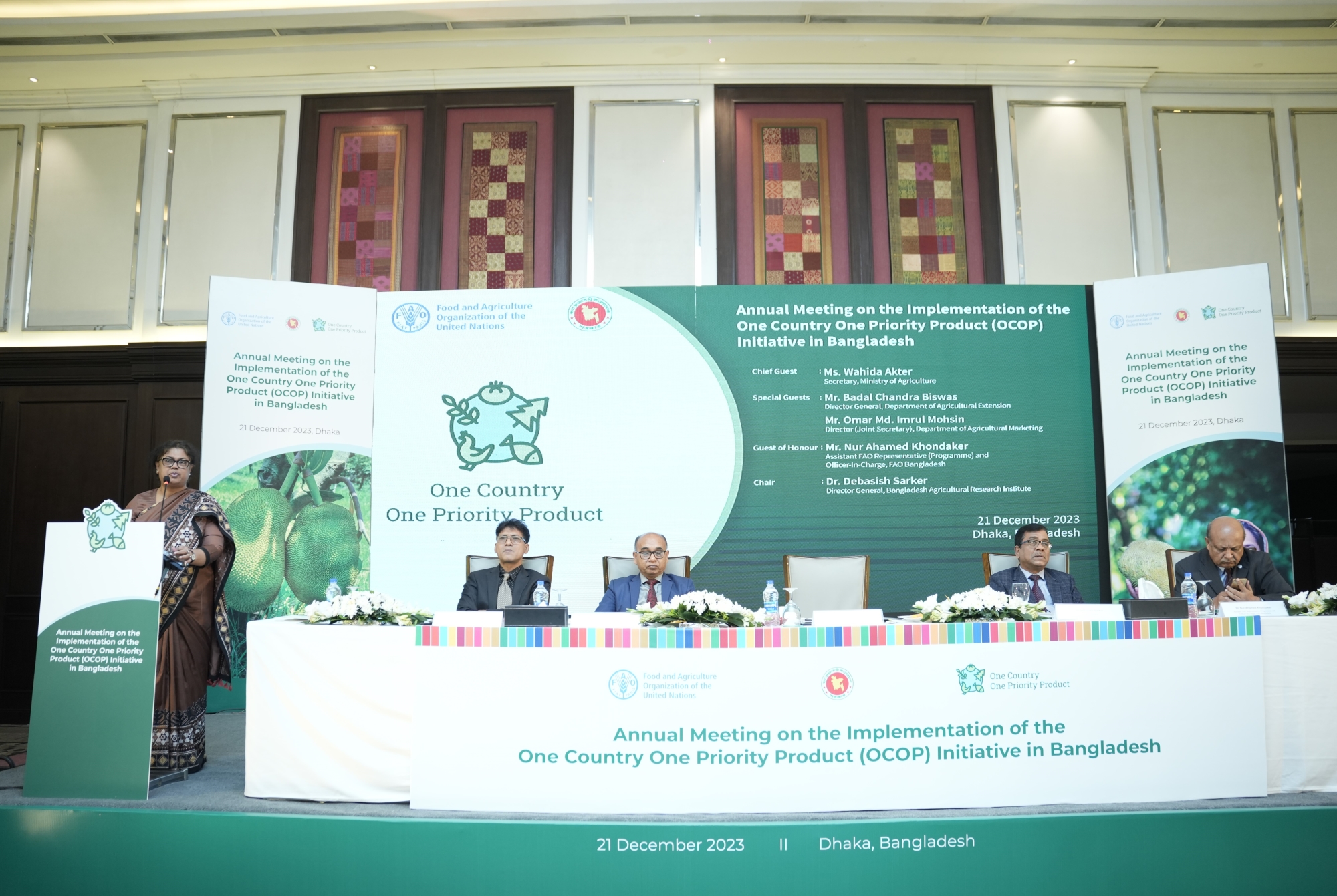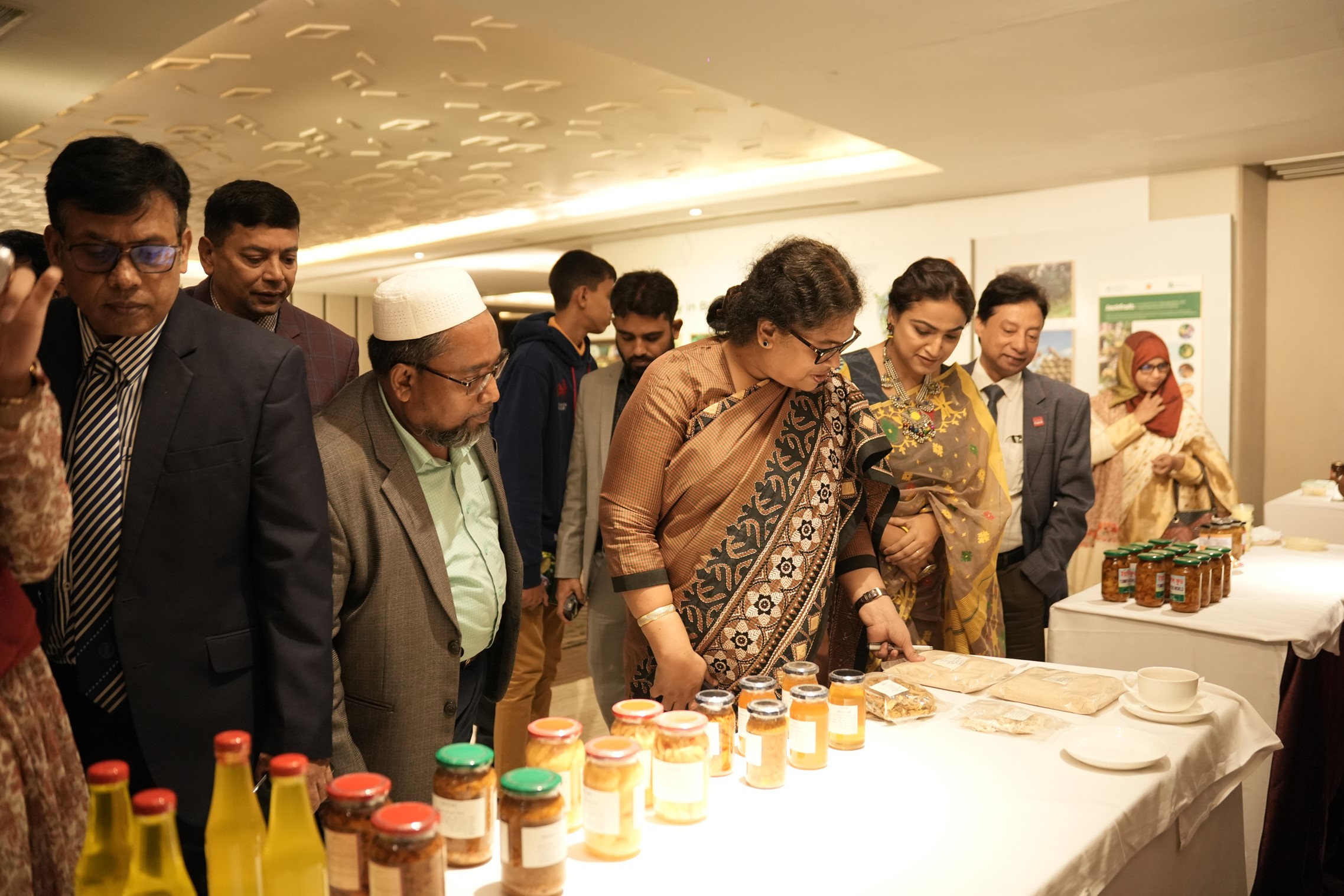News
Bangladesh charts action plans for jackfruit value chain development under the FAO OCOP initiative

Participants at the FAO OCOP Annual Meeting 2023.
©FAO
21 December 2023, Dhaka - Representatives from government, academia, development organizations, researchers, traders, and exporters converged in Dhaka on December 21 to chart the future of Bangladesh's jackfruit sector. Facilitated by the Food and Agriculture Organization of the United Nations (FAO) and the Ministry of Agriculture, the National Annual Meeting under the FAO One Country One Priority Product (OCOP) Initiative was held at Hotel Le Meridien, Dhaka aiming to strengthen the jackfruit value chain.
The meeting, attended by 120 participants, aimed to review progress and set priorities for jackfruit value chain development. Key objectives included assessing achievements in 2023, formulating a robust national work plan for 2024–25, and fostering deeper collaboration.
Highlights of the meeting
The event commenced with Mr. Anil Das, National Consultant (Program), providing opening remarks. Mr. Md. Abdul Kader, National Senior Lead Agronomist of FAO Bangladesh, presented an overview of FAO's OCOP Initiatives and its implementation in Bangladesh, while Dr. Munshi Rashid Ahmad, Director of Horticulture Research Centre of Bangladesh Agricultural Research Institute (BARI) and OCOP National Focal Point, highlighted the key achievements and lessons learned in 2023. Dr. Mohammad Jahangir Alam, Professor of the Department of Agribusiness and Marketing at Bangladesh Agricultural University, discussed the sustainable value chain of jackfruit in Bangladesh and emphasized the importance of developing new jackfruit products and linking smallholder farmers to markets.
Mr. Nur Ahamed Khondaker, Assistant FAO Representative (Programme) and Officer-In-Charge of FAO Bangladesh, congratulated the participants on their progress and expressed FAO's continued support for the OCOP initiative. Mr. Badal Chandra Biswas, Director General of the Department of Agricultural Extension (DAE), and Mr. Md. Masud Karim, Director General of the Department of Marketing (DAM), Ministry of Agriculture, gave speeches as special guests highlighting the importance of jackfruit development. Ms. Wahida Akter, Secretary of the Ministry of Agriculture and the Chief Guest of the event, emphasized the need for continued collaboration and cooperation to fully realize the potential of the OCOP initiative for the development of the jackfruit sector in Bangladesh. The inaugural session of the meeting concluded with remarks from Dr. Debasish Sarker, Director General of BARI.
During the technical session, success stories in jackfruit processing were shared, highlighting the impact at the grassroots level. Mr. Sreekanta Sheel, National Value Chain Specialist, FAO Bangladesh, presented key outputs of the OCOP global project "Innovative Approaches for Better Plant Production" funded through the FAO Flexible Voluntary Contribution (FVC), fostering an open discussion on jackfruit value chain development.
The meeting culminated in the presentation of a comprehensive work plan for 2024–25. Stakeholders, including representatives from BARI and DAM, outlined research priorities, opportunities for processing, value addition, and private sector engagement.

Inaugural session of the OCOP Annual Meeting. ©FAO
Untapped potential of Jackfruit
Nutritious jackfruit is one of the most important and widely grown fruits in the country, but its potential has been largely unexploited. In terms of annual production, jackfruit is the second-largest fruit in the country after mango, accounting for more than one-fifth of total fruit production. It contributes significantly to the nutrition of the people of Bangladesh as a source of vitamins, minerals, and calories. Despite these nutritional benefits and largely untapped export potential, jackfruit has received little attention for value addition in the country.
Bangladesh has made remarkable progress in promoting jackfruit production and exploring its export potential during the implementation of the OCOP initiative. A national task force has been established to oversee and facilitate the implementation of the OCOP in the country, and several activities have been undertaken, including jackfruit value chain analysis, capacity development trainings for farmers, a global project funded by FVC, and a TCP project in five major jackfruit-growing districts, etc.

Ms. Wahida Akter, Secretary, Ministry of Agriculture, is visiting the stalls with jackfruit products. ©FAO
Way forward
The meeting yielded crucial suggestions, emphasizing postharvest handling, financial support, research on varietal development, and the introduction of off-season varieties. Recommendations also included awareness campaigns on jackfruit's nutritional value, linking agro-processing SMEs with large-scale industries, developing a jackfruit policy, and improving storage facilities.
The successful collaboration among the government, FAO, and various stakeholders, coupled with on-the-ground initiatives, demonstrates Bangladesh's commitment to realizing the full potential of jackfruit. The OCOP initiative is poised to generate employment, uplift rural communities, and contribute to the country's overall economic progress. The meeting's outcomes are a testament to the dedication to creating a sustainable and profitable environment for local products in both domestic and international markets.
- One Country One Priority Product webpage
- FAO Bangladesh webpage
- Regional Knowledge Platform on One Country One Priority Product (OCOP) in Asia and the Pacific
- FAO launches OCOP global project under FAO-China South-South Cooperation
- FAO Regional Launch and Workshop on the Implementation of OCOP Country Projects in Asia and the Pacific
- In Asia and the Pacific, OCOP promotion of highly-valued and country-specific foods is gaining momentum for domestic and foreign consumption
- First Meeting of National Task Force held to facilitate the Implementation of OCOP in Bangladesh
- FAO Regional Organizing Group for OCOP holds its first meeting to advance sustainable agrifood systems in Asia and the Pacific
- Expert training on value chain analysis for OCOP Demonstration Countries from all FAO Regions
- Humble jackfruit is the country’s star fruit and ripe for export
